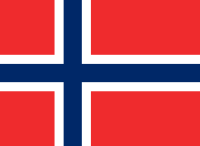Norway
From Kaiserreich
Norway is a country in Scandinavia. It is bordered by Sweden in the west and Finland in the northernmost part of the country.
| ||||||
| Motto Alt for Norge (Everything for Norway) | ||||||
| Anthem Ja, vi elsker dette landet | ||||||

| ||||||
|
| ||||||
| Official Language | Norwegian | |||||
| Capital | Oslo | |||||
| Head of State | Haakon VII | |||||
| Head of government | Johan Nygaardsvold | |||||
| Establishment Independence from a personal union with Sweden | 7 June 1905 | |||||
| Government | Constitutional Monarchy | |||||
| Currency | Norwegian krone | |||||
| Area | ca. 385.000 km^2 | |||||
| Population | ca. 2.8 million | |||||
History
For centuries Norway had been part of the Danish realm until Denmark had to cede - without Iceland or Greenland - it to Sweden in the Peace of Kiel. An attempt of the Norwegians to proclaim independence from their Swedish neighbour was foiled by a military intervention by King Karl XIII. However, the Swedish king allowed his new subjects internal autonomy by recognizing their constitution. Tensions between the parliament (Storting) and the king in Sweden escalated in the 1870. Under leadership of the liberal left (Venstre) the country turned into parliamentary monarchy in 1884 with universal suffrage after 1898 (till 1913 only for men).
With Norway's rise as a trading power in the 19th century came claims to install consulates in other countries. Resistance by Sweden against this claim caused the end of the Union between the countries in 1905. The Danish prince Karl was elected King Haakon VII. Despite British demands Norway remained neutral during World War I, even though it lost half its merchant marine to Germany's unrestricted U-Boat warfare.
In 1920, it was awarded Spitzbergen despite Russian claims to the islands. The transition of from an agricultural country to a modern industrial state brought with it inflation and unemployment after The Great War, leading to a radicalization of the Workers' Party which had been founded in 1887. In 1923 a Bolshevik Party was formed, and in 1933 appeared the radical populist party Nasjonal Samling under leadership of Vidkun Quisling.
Foreign relations
Officially, Norway follows the Nordic ideal of neutrality and thus remains outside any military alliances that have formed in the world after the Weltkrieg. The Workers' Party and Bolshevik Party have friendly contacts with their counterparts in Union of Britain and Commune of France, but remain outside the Internationale. The Nasjonal Samling has contacts with National Populist elements in Europe, like the Grossdeutsche Volkspartei in Germany and the Lapua movement in Finland.


